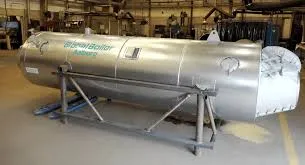steam boiler for textile mill product
The Vital Role of Steam Boilers in Textile Mills
In the bustling textile industry, where production efficiency and quality control are paramount, steam boilers play an indispensable role. They serve as the backbone for numerous processes, ensuring that mills operate smoothly and products meet stringent standards. This article will delve into the significance, operation, and advancements of steam boilers specifically tailored for textile mills.
Understanding the Functionality of Steam Boilers
A steam boiler is essentially a closed vessel that heats water to create steam through the application of heat. In textile mills, this steam is crucial for a variety of applications, including dyeing, washing, and finishing processes. The steam provides the necessary heat and pressure to facilitate these operations, influencing the quality and speed of production.
The primary functions of steam boilers in textile mills include
1. Heating Steam raises the temperature of water required in dyeing and washing, ensuring that colors adhere properly and fabrics are thoroughly cleaned. 2. Pressure Generation The steam produced can be used for power generation or to activate steam-driven machinery, enhancing workflow. 3. Sterilization High-pressure steam is used to sterilize equipment and fabrics, ensuring product hygiene and quality.
Types of Steam Boilers in Textile Mills
Textile mills typically utilize two main types of steam boilers fire-tube boilers and water-tube boilers.
- Fire-Tube Boilers These are the most common type used in small to medium-sized mills. The design features combustion gases flowing through tubes surrounded by water. Benefits include a compact design, low cost, and ease of maintenance.
- Water-Tube Boilers More suitable for larger operations, these boilers have water-filled tubes heated from the outside by combustion gases
. They are known for their efficiency, ability to handle high pressures, and quick steam generation times.Both boilers find their applications based on the specific needs of the textile mill, with considerations such as size, production capacity, and operational requirements coming into play.
steam boiler for textile mill product

The Economic Impact of Efficient Steam Boilers
Investing in modern, efficient steam boilers can significantly reduce operational costs for textile mills. Traditional boilers may have high fuel consumption rates, leading to increased energy bills. However, advanced steam boilers designed for efficiency can deliver steam with lower fuel usage, translating to considerable savings in operational expenses.
Furthermore, efficiency also correlates with reduced environmental impact. Modern boilers are designed to minimize greenhouse gas emissions and comply with stringent environmental regulations. This not only contributes to sustainability efforts but also enhances the mill's reputation in a marketplace that increasingly values eco-friendly practices.
Technological Advancements
The steam boiler industry has seen substantial technological advances over the past few years. Today’s steam boilers come equipped with monitoring and control systems that allow for real-time data tracking and management. Features like automated controls improve fuel efficiency, reduce emissions, and provide predictive maintenance alerts.
Additionally, the integration of Internet of Things (IoT) technology allows textile mills to monitor steam boiler performance remotely. This level of oversight enables quicker response times to potential issues, ultimately preventing costly downtimes and ensuring continuous production flow.
Compliance and Safety in Operation
Safety standards and regulatory compliance are crucial in the operation of steam boilers within textile mills. Regular inspections, maintenance, and adherence to safety protocols ensure not only the longevity of the equipment but also the safety of the workforce. Implementing best practices in steam boiler maintenance can mitigate risks associated with pressure, temperature, and chemical exposure.
Conclusion
Steam boilers are essential components in textile mills, driving essential processes that contribute to the overall efficiency and output of the industry. With the continued evolution of technology and a focus on sustainability, steam boilers are more efficient than ever, providing economic and environmental benefits. As the textile industry continues to grow and adapt, the importance of reliable steam boilers will remain a pivotal aspect of its success. Investing in advanced steam technology is not just a matter of maintaining production; it is a step towards a more sustainable and efficient future for textile manufacturing.
-
Weil-McLain EG-55 Steam Boiler Reliable Gas HeatingNewsJun.03,2025
-
Skid Type Steam Boiler - Efficient, Pre-Assembled for Quick InstallNewsJun.03,2025
-
Top Waste Heat Boiler Manufacturers Energy Efficient Industrial SolutionsNewsJun.03,2025
-
Reliable PLC Steam Boilers Efficient Industrial SolutionsNewsJun.03,2025
-
Top Waste Heat Recovery Boiler Manufacturers Energy-Efficient SolutionsNewsJun.03,2025
-
Hot Water & Industrial Steam Boiler Factory Custom SolutionsNewsJun.02,2025

